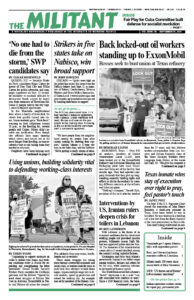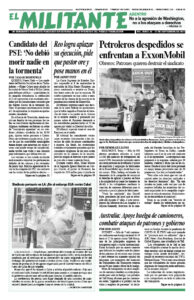On Sept. 8 the U.S. Supreme Court stayed the execution of John Henry Ramirez, a death-row prisoner in Texas, three hours before he was to be killed. He was waiting in a holding cell a few feet from the death chamber at the state penitentiary in Huntsville.
The court ruling overturned an earlier federal appeals court decision denying Ramirez’s right to have his pastor in the death chamber, praying with and laying hands on him. Ramirez had sued prison authorities Aug. 10 for violating his religious freedom.
The high court took control over Ramirez’s case, to discuss it in the fall.
The court has heard a number of recent cases concerning the religious rights of death-row prisoners. In Texas, state officials now allow prisoners’ own religious advisers into the death chamber, but deny them the right to pray together out loud or have any physical contact. For four years, Dana Moore of the Second Baptist Church in Corpus Christi, Ramirez’s pastor, has driven 300 miles to visit him at the death-row unit of the state prison in Livingston. They speak through handsets on either side of a plexiglass window and pray by pressing their palms against the window.
Inmates like Ramirez “are in solitude all the time,” Moore told the New York Times. “The only time they are touched is when handcuffs go on and when handcuffs come off.” Ramirez greets his visitors with a fist bump on the window. “We have no human contact back here,” he said.
Ramirez has been on death row since 2008 after being convicted of stabbing store clerk Pablo Castro to death seeking money to buy drugs when he was age 20 in 2004. He took $1.25 from the dying clerk’s pocket.
“Mr. Ramirez takes responsibility for the crime, which he calls a ‘heinous murder,’” the Times reported. “He declined to attribute his actions to his childhood marked by abuse, instability and poverty. ‘There’s a lot of people that live that and even worse, and they didn’t end up on death row,’ he reflected.”
In prison Ramirez has become a voracious reader, writes poetry, draws and writes letters to supporters.
A Texas Department of Criminal Justice official claimed, “Everything surrounding the execution process and the Texas execution protocol is based on safety and security,” and that Ramirez’s request opens the door to ever-more-burdensome religious requests.
Ramirez’s attorney, Seth Kretzer, scoffed at the state’s argument: “You’re in the most secure facility in the entire prison system.”
The U.S. Constitution’s protection of the right to worship is at the heart of Ramirez’s fight. “What will happen? I’ll have a true spiritual moment at the point of death and you don’t want me to have that?” Ramirez asked. “You want to keep that from me, too?”

